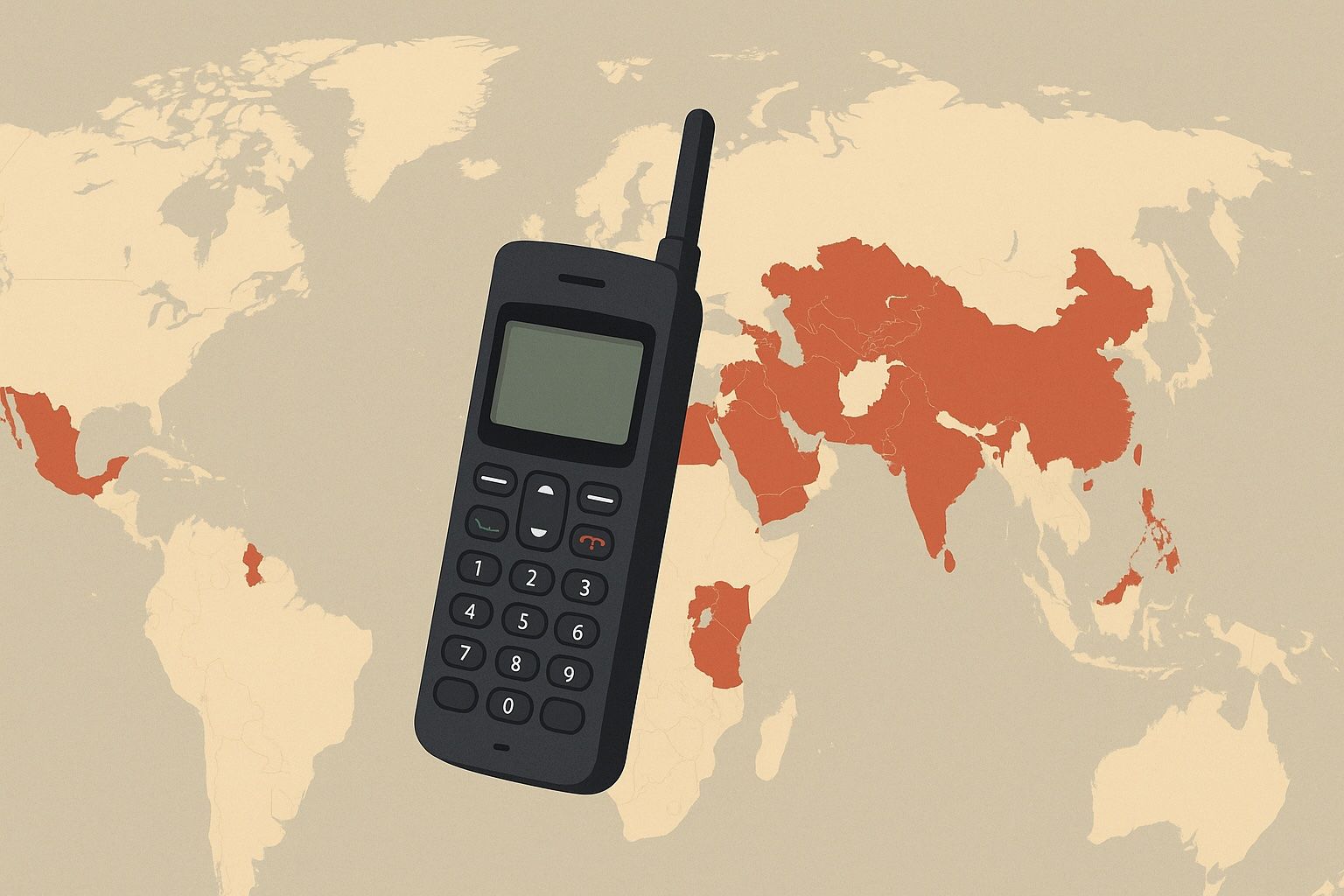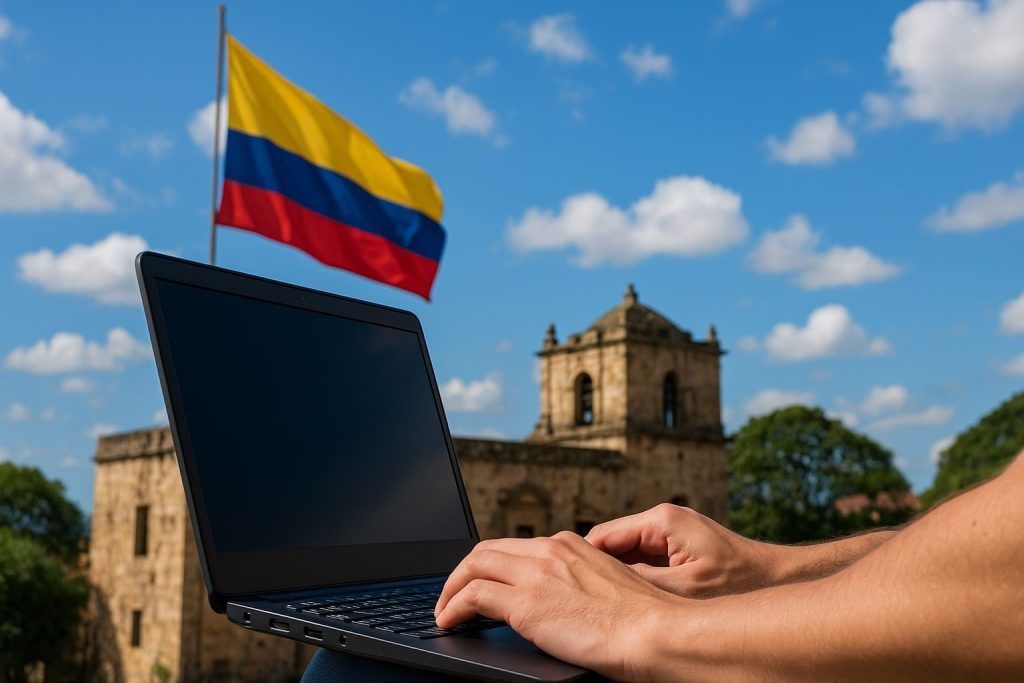- Bangladesh bans satellite phone use; possession can lead to arrest and imprisonment.
- North Korea prohibits all unauthorized communication devices, foreigners must surrender phones and privacy is not guaranteed, with detention possible.
- India restricts satellite phones to government‑approved Inmarsat devices, requiring a license (No Objection Certificate) from the Department of Telecommunications before bringing one in.
- China maintains a de facto ban on private sat phones, requiring registration for limited state use and has deployed jammers in some areas to block unapproved devices.
- Chad bans satellite phones under any circumstances, with Thuraya explicitly outlawed and Iridium sometimes tolerated.
- Myanmar (Burma) effectively bans satellite phones under the current military regime, with enforcement tightened after the 2021 coup. Turkmenistan prohibits possession or use of satellite phones, with strict monitoring by the authoritarian government.
- Russia allows sat phones only with prior authorization, requiring SIM registration with Roskomnadzor and typically a six‑month validity.
- Sri Lanka requires a license from the Telecommunications Regulatory Commission (TRCSL) to use a satellite phone, and unlicensed devices are commonly confiscated.
- Mauritius since 2022 requires satellite phones to be registered and licensed with the Information and Communication Technologies Authority (ICTA), with temporary permits for yachts.
Introduction
Satellite phones are invaluable for staying connected in remote or disaster-stricken areas, but travelers must be aware that these devices are not welcome everywhere. In fact, several countries ban or tightly regulate satellite phones due to security and government control concerns en.wikipedia.org. Because satellite phones communicate directly via satellites and bypass local telecom networks, authorities in some nations fear they could be used for espionage, insurgency, or bypassing censorship en.wikipedia.org globalrescue.com. Possessing an unauthorized sat phone in such places can lead to confiscation, fines, arrest, expulsion, or even imprisonment globalrescue.com apollosat.com. It is crucial for travelers and businesses to know where satellite phones are illegal or restricted, understand the reasons behind these policies, and comply with local laws to avoid serious penalties.
Why Do Some Countries Ban Satellite Phones?
The motives for banning or restricting satellite communications vary by country, but common themes include:
- National Security and Anti-Terrorism: Several bans followed incidents where militants or terrorists used sat phones to coordinate attacks. For example, India outlawed unlicensed satellite phones after terrorists used them in the 2008 Mumbai attacks globalrescue.com. Nigeria similarly banned sat phones in conflict-prone regions (like Borno state) after Boko Haram fighters were found using them globalrescue.com. Authorities fear that unmonitored communications facilitate terrorist plots.
- Government Surveillance and Censorship: Sat phone signals bypass local networks, making them hard to monitor or block. In China, for instance, private satellite phone use was banned for decades and authorities even deployed jammers to prevent their use globalrescue.com. North Korea and Turkmenistan outright forbid satellite phones to maintain strict control over information flow and prevent citizens from communicating without state oversight globalrescue.com static.mackaycomm.com. Oppressive regimes consider sat phones tools of “subversive” communication.
- Espionage and Unauthorised Information Sharing: Some governments view foreign satellite devices as a spying threat. Cuba classifies satellite phones as illegal import items, fearing they could be used to secretly transmit information abroad; being caught with one can even trigger espionage charges apollosat.com. During Libya’s 2011 civil war, the regime banned Thuraya sat phones and arrested users as suspected spies 1 .
- Regulatory Control and Licensing: A few countries permit satellite phones only under strict regulation so that authorities can intercept or control the service. India, for example, allows only Inmarsat network phones that are registered and licensed with the Department of Telecommunications globalrescue.com. Russia requires users (especially foreigners) to pre-register SIM cards and obtain approval from its communications regulator, enabling the government to monitor calls ostensibly to combat terrorism apollosat.com. These measures integrate sat phones into the local telecom regulatory framework.
In addition, some countries mandate that sat phones be obtained through official channels or local service providers (e.g. China began allowing limited sales via state-run carriers in recent years en.wikipedia.org). In summary, the tighter a government’s grip on communications and security, the more likely it restricts satellite phones.
Countries with Outright Bans on Satellite Phones
The following countries completely ban civilian use or possession of satellite phones, with no realistic path to get approval as an ordinary traveler. Bringing a sat phone into these nations can result in immediate confiscation and arrest.
- Bangladesh: All satellite phone use is illegal. Possession of a sat phone can lead to arrest and imprisonment apollosat.com. This policy is driven by security concerns and the government’s desire to control communications. Travelers cannot obtain any permit, so satellite devices should be left at home.
- Chad: Satellite phones are deemed illegal due to ongoing terrorist threats in the region. No permits are issued “under any circumstances,” and anyone found with a sat phone faces confiscation of the device and possible arrest apollosat.com. (Notably, some sources indicate Chad specifically banned Thuraya-brand phones, while Iridium phones might be tolerated, but travelers should not count on this distinction 2 .)
- Myanmar (Burma): Under the current military regime, satellite phones are effectively banned. Historically, Myanmar’s junta outlawed private comms to prevent information leaks during decades of unrest globalrescue.com. A brief liberalization occurred in the 2010s, but after the 2021 coup the environment has again tightened. Enforcement may vary, but travelers should assume sat phones are forbidden unless one has an official permit (which is very unlikely to be granted).
- North Korea: All unauthorized communication devices are banned. Foreigners entering North Korea must usually surrender phones and have “no right to privacy,” so a satellite phone is strictly prohibited globalrescue.com. Possession would almost certainly result in detention. The regime’s total control over information is the rationale.
- Turkmenistan: The possession and use of satellite phones in Turkmenistan is illegal. This Central Asian nation’s authoritarian government tightly monitors communications, and sat phones are viewed as potential tools for illicit information flow. Travelers have reported that authorities strictly enforce this ban 3 .
- Others (Complete Bans): South Sudan has at times been cited for prohibiting sat phones, but in practice it requires registration of such devices rather than a blanket ban (see restricted list below) support.satellitephonestore.com support.satellitephonestore.com. Ethiopia has intermittently cracked down on satellite phones during states of emergency (e.g. in conflict zones), treating unregistered devices as illegal; official permission from the telecom ministry is needed to import or use one static.mackaycomm.com static.mackaycomm.com. Nicaragua is sometimes mentioned for restrictive telecom policies – reports suggest the government views unlicensed sat phones as illegal, likely due to their use by opposition groups phonearena.com. When in doubt, always check the latest advisories before travel, but in these countries a conservative approach is to not carry a satellite phone at all.
Countries with Restrictions or Permit Requirements
Many other countries do allow satellite phones, but only under strict conditions. Typically, users must register the device, obtain a license or permit in advance, or use specific approved networks. Using a sat phone without following the proper procedures in these places is illegal and can result in penalties. Below are countries with notable restrictions:
- India: Satellite phones are heavily regulated. Only phones operating on the government-approved Inmarsat network are allowed, and users must obtain a license (No Objection Certificate) from India’s Department of Telecommunications before bringing the device into India apollosat.com. All other satellite services (e.g. Thuraya, Iridium) are banned in India’s territory en.wikipedia.org. Foreigners who arrive with an unlicensed sat phone have been arrested and fined globalrescue.com globalrescue.com. The rules stem from India’s Telegraph Act and were tightened after terrorists abused sat phones in 2008 globalrescue.com. Travelers should only use sat phones in India if properly licensed through an Indian telecom provider.
- Russia: Satellite phones are allowed with prior authorization. Travelers must apply for approval and register their SIM card with Roskomnadzor (the state communications regulator) before using a sat phone in Russia apollosat.com. Registration is typically valid for six months apollosat.com. These regulations, introduced in 2012, aim to let security services intercept calls to combat terrorism en.wikipedia.org. Using an unregistered sat phone in Russia can lead to confiscation or legal trouble.
- Cuba: Cuba treats satellite phones as forbidden imports unless you secure a government permit. Cuban customs will seize any undeclared sat phone; a permit from the Ministry of Communications is required to bring one in legally apollosat.com. The Cuban government tightly controls communications and fears sat phones could be used for “subversive” activities apollosat.com. Penalties for unauthorized sat phones can be severe (including arrest on espionage suspicions) apollosat.com. In practice, it is very difficult for a short-term visitor to get a permit, so travelers should assume sat phones are off-limits in Cuba.
- Sri Lanka: Sri Lanka permits satellite phones, but users must obtain a license from the Telecommunications Regulatory Commission ahead of time apollosat.com. This rule historically applied especially to foreign journalists and media personnel, who need clearance to bring in communications equipment. Using a sat phone without a license could result in confiscation. Travelers planning to trek or sail in Sri Lanka should arrange the necessary license or use alternative means.
- Sudan: Sudan has broad restrictions on electronics, and satellite phones require special approval. Travelers should declare satellite phones when applying for a Sudanese visa and be prepared for the devices to be held by customs on arrival apollosat.com. The Sudanese National Telecommunication Corporation must license sat phones static.mackaycomm.com. Not following the proper channels can lead to the phone being confiscated indefinitely at the airport apollosat.com. Given Sudan’s volatile security situation, authorities are very cautious about unmonitored communications.
- China: China long banned private sat phones, though in recent years it has allowed limited use through state-sanctioned providers. Today, satellite phones in China must be registered with the government, and using unapproved devices is illegal globalsatellite.us globalsatellite.us. Enforcement is strict in sensitive border regions and Tibet/Xinjiang. China’s concern is that sat phones circumvent the Great Firewall and could be used to smuggle information out. Foreign expeditions in remote Chinese regions must rent devices through China Telecom or similar, or risk confiscation at customs (China has been known to deploy signal jammers and detection vans for illegal sat phone signals) 4 .
- Pakistan: Pakistan prohibits satellite phones in certain areas. In particular, sat phones were banned in the tribal regions during military operations against insurgents (for fear militants would use them) globalrescue.com. The law in the rest of Pakistan is a gray area – there is no blanket nationwide ban, but carrying a sat phone may draw scrutiny. It’s best to consult Pakistani authorities or your embassy before traveling with one globalrescue.com. When traveling near conflict zones or borders (e.g. parts of Khyber Pakhtunkhwa or Balochistan), assume satellite communicators are viewed with suspicion.
- South Sudan: South Sudan requires mandatory registration of sat phones and similar devices with the government. Travelers must present their satellite phone and a government approval or registration document upon arrival support.satellitephonestore.com support.satellitephonestore.com. Without prior registration, the phone will be seized at customs and held until proper paperwork is obtained static.mackaycomm.com. This policy is intended to control military-grade communications in a country with ongoing internal conflict. Always coordinate with South Sudanese authorities or NGOs to get clearance if a sat phone is truly needed for your work there.
- Ethiopia: Importing or using a satellite phone in Ethiopia requires written permission from the Ministry of Innovation and Technology (formerly Communication & IT) static.mackaycomm.com. Ethiopia’s state-owned EthioTelecom has arrangements with Thuraya and Iridium, and authorities prefer any sat communication to go through the national carrier static.mackaycomm.com. If you arrive at Addis Ababa airport with a sat phone, you must show a prior permit, otherwise customs will confiscate the device until you obtain one static.mackaycomm.com. This became especially enforced during periods of unrest (e.g. the Tigray conflict) when the government tried to control news and military communications.
- Mauritius: Since 2022, Mauritius introduced regulations on satellite phones en.wikipedia.org. Owners now must register and license their sat phones with the Information & Communication Technologies Authority (ICTA). This policy change means travelers or yachts arriving in Mauritius with a sat phone should contact ICTA for a temporary permit or risk the phone being impounded. The move was part of a broader telecom law update, likely to ensure proper spectrum use and security monitoring.
- Thailand and Vietnam: Both Thailand and Vietnam treat unapproved radio transmitters (including sat phones) as illegal imports. Thailand requires individuals to obtain a license from the National Broadcasting and Telecommunications Commission (NBTC) for any satellite communication device, effectively meaning tourists should not bring one unless they have prior authorization itnerd.blog. Vietnam similarly insists on government permission; unauthorized sat phones may be confiscated at the border itnerd.blog. These countries’ regulations are rooted in controlling radio frequency devices and preventing unauthorized communications (a legacy of past security concerns).
- Other Notable Cases: Libya no longer has a formal law against satellite phones post-2011, but in practicetravelers have reported that Libyan customs will seize sat phones, GPS units, and even personal trackers on arrival static.mackaycomm.com static.mackaycomm.com. This likely stems from lingering paranoia and “opaque laws” – officials err on the side of confiscation even without a clear ban. Iran is another country where satellite phones exist in a legal gray zone. U.S. sat phone companies cannot provide services there due to sanctions support.satellitephonestore.com, and Iranian authorities suspicious of foreign devices may detain users (especially during protests or if near sensitive sites). When planning travel to any country with a history of telecom restrictions or authoritarian governance, you should assume a satellite phone will be problematic unless you have explicit permission.
The landscape can change due to political shifts, conflict, or new laws, so always research the latest regulations for your destination. Many embassies publish advisories on satellite phone use; for example, the U.S. and U.K. travel advisories often mention if these devices are banned in a country.
Implications for Travelers and Businesses
Travelers carrying a satellite phone must plan carefully if visiting countries with bans or restrictions. The consequences of a mistake can be serious. As security experts warn, if you arrive in a country with an illegal item, best case it will be confiscated, and worst case you could be fined, detained, or jailed globalrescue.com globalrescue.com. Here are key implications and tips:
- Legal Penalties: Unauthorized possession of a sat phone can violate local laws. Penalties range from monetary fines up to long prison sentences in the harshest regimes. For instance, a foreign traveler in India was arrested and spent days in custody for carrying an unlicensed Garmin inReach (satellite messenger) – she avoided jail only after paying bail and legal fees itnerd.blog itnerd.blog. In North Korea or similar states, punishment could be far more severe.
- Device Confiscation: In many cases, authorities will simply seize your satellite device at the border or airport. This is common in countries like Chad, China, Libya, and Sudan where customs officers are on alert static.mackaycomm.com. You may never get the phone back, or it could be held until you leave. It’s essentially a forfeiture of expensive equipment. Assume that any undeclared sat phone in your luggage will be X-rayed and discovered.
- Suspicion and Surveillance: Carrying a sat phone might draw unwanted attention from security services. You could be viewed as a spy or illicit actor. Authorities might subject you to intense questioning or monitor your activities if they suspect you intended to use a sat phone clandestinely apollosat.com globalrescue.com. This can jeopardize your broader mission or travel plans. Businesses operating in such countries risk having their staff detained on espionage suspicions if sat comms are not cleared in advance.
- Compliance Strategies: Always obtain required permits or licenses well before your trip, via the country’s embassy or telecom agency, if possible. For example, journalists going to Sri Lanka should apply for the TRC license weeks ahead apollosat.com, and mountaineers in India must arrange an Inmarsat rental and DoT license prior to arrival apollosat.com. Keep documentation of any approval to show customs. If you cannot get official permission, strongly reconsider bringing the device.
- Alternative Solutions: In restricted zones, look for alternative communication options. Sometimes a local licensed sat phone can be rented in-country (with the government’s knowledge). In other cases, a good local guide or partner will have their own permitted device for emergencies globalrescue.com. For less severe restrictions, devices like one-way emergency beacons or GPS messengers might be tolerated where full sat phones are not (though as noted, even these were treated as illegal in India). Always consult with tour operators or business contacts about what communications gear is allowed – they may suggest using local SIM cards, radio networks, or other methods that comply with local laws 5 .
- Preparation and Disclosure: If you decide to travel with a satellite communicator, declare it at customs if required. Being upfront can prevent accusations of smuggling it in. Have the contact info of legal counsel or your embassy handy in case of trouble. Businesses should train employees on these rules and possibly restrict staff from carrying sat devices into high-risk countries. It’s often wiser to station satellite equipment in a neighboring country and not cross the border with it.
Above all, stay updated. Laws can change quickly in response to political events. A country that once allowed sat phones could ban them overnight during a security crackdown (and vice versa). Consult official sources (embassy websites, the U.S. State Department or UK FCDO travel advisories, etc.) right before your trip to catch any last-minute changes apollosat.com support.satellitephonestore.com. When in doubt, err on the side of leaving the satellite phone behind if your destination has any history of restrictions – your safety and freedom come first.
Summary Table: Satellite Phone Laws by Country
For quick reference, the table below summarizes where satellite phones are banned, restricted, or allowed, along with any permit requirements, the primary reasons for the policy, and notes on enforcement as of 2025:
| Country | Legal Status | Permit/Registration | Reason for Restriction | Enforcement & Notes |
|---|---|---|---|---|
| Bangladesh | Banned (illegal to possess) apollosat.com | No permits granted (outright ban) | National security; unmonitored comms feared en.wikipedia.org | Arrest and imprisonment possible for sat phone users apollosat.com. |
| Chad | Banned (sat phones illegal) apollosat.com | No (not issued under any circumstances) apollosat.com | Counter-terrorism (prevent militant communication) apollosat.com | Confiscation and arrest if found with device apollosat.com. (Thuraya specifically outlawed; Iridium nominally tolerated static.mackaycomm.com.) |
| China | Banned (private sat phones) globalrescue.com | De facto ban unless obtained via state providers | Government censorship and control of information globalrescue.com | Signals are jammed/blocked; unregistered devices confiscated. Limited official use via China Telecom since 2016 en.wikipedia.org. |
| Cuba | Banned (except by permit) apollosat.com | Yes – Permit required from Ministry of Communications apollosat.com | Regime security; viewed as subversive/espionage tools apollosat.com | Forbidden item at customs outfittersatellite.com; unauthorized sat phone can lead to arrest (espionage charges) apollosat.com. |
| India | Restricted (tightly regulated) globalrescue.com | Yes – License (NOC) required from DoT for Inmarsat only apollosat.com | National security (terrorism concerns) & regulatory control globalrescue.com | Foreigners must not bring unlicensed sat phones – arrests, fines, and device seizures have occurred globalrescue.com globalrescue.com. |
| Libya | Allowed (no current law ban) | N/A (no formal license system) | — (Formerly banned Thuraya in 2011 for espionage fears globalrescue.com) | Caution: Authorities often confiscate sat phones and GPS devices at airports despite no explicit ban static.mackaycomm.com. Travelers report arbitrary enforcement. |
| Myanmar (Burma) | Banned (effectively illegal) globalrescue.com | Theoretically by special permit (rarely granted) | Military regime control; prevent information leaks globalrescue.com | Historically banned under junta; current enforcement is strict post-2021 coup. Assume any sat phone will be seized. |
| Nigeria | Partially banned(regional) outfittersatellite.com | No formal permit system (legal status unclear nationally) | Anti-terrorism in conflict areas (Boko Haram) outfittersatellite.com | Banned in Borno state since 2013 outfittersatellite.com; elsewhere use is risky – check current local rules. |
| North Korea | Banned (total prohibition) globalrescue.com | No (not allowed at all) | Absolute state control of communications globalrescue.com | All unauthorized comm devices confiscated. Severe penalties for locals; foreigners closely monitored globalrescue.com. |
| Pakistan | Restricted (in sensitive areas) globalrescue.com | No national permit regime (may require military approval in tribal regions) | Prevent militant use in insurgency-hit regions globalrescue.com | Sat phones banned in parts of NW Pakistan (tribal areas) globalrescue.com. Enforcement elsewhere is inconsistent – travelers should get advice from authorities. |
| Russia | Restricted (regulated use allowed) apollosat.com | Yes – Pre-approval & SIM registration with Roskomnadzor apollosat.com | National security; enable call interception by FSB en.wikipedia.org | Unregistered devices can be seized. Foreigners can register for up to 6 months apollosat.com. Using unapproved networks (e.g. foreign SIM) is illegal. |
| Sri Lanka | Restricted (permit required) apollosat.com | Yes – License from telecom regulator (TRCSL) apollosat.com | Regulatory control; prevent unvetted use by media or others | Common for journalists to get clearance apollosat.com. Unlicensed sat phone likely confiscated at entry. |
| Sudan | Restricted (strictly controlled) apollosat.com | Yes – Approval & license from telecom authority static.mackaycomm.com | Internal security during unrest; monitor communications | Must declare device on visa application apollosat.com. Customs may hold devices indefinitely pending inspection apollosat.com. |
| South Sudan | Restricted (regulated; must declare) support.satellitephonestore.com | Yes – Registration with government required support.satellitephonestore.com | Control of military-grade comms in conflict zones | Devices unregistered on arrival are seized until a permit is obtained static.mackaycomm.com. Prior coordination advised if use is essential. |
| Ethiopia | Restricted (permit needed) static.mackaycomm.com | Yes – Written permission from Min. of Comm/IT before import static.mackaycomm.com | National security and state telecom monopoly static.mackaycomm.com | Without permit, phone will be confiscated at airport static.mackaycomm.com. Non-EthioTelecom devices raise suspicions. |
| Turkmenistan | Banned (illegal to own or use) static.mackaycomm.com | No (no legal way to use) | Authoritarian info control (paranoid regime) hrw.org static.mackaycomm.com | Very strict enforcement – travelers have been searched for sat comm devices. Expect confiscation and interrogation if one is found. |
| Mauritius | Restricted (recently regulated) en.wikipedia.org | Yes – License required from ICT Authority (from 2022) en.wikipedia.org | Spectrum regulation and security oversight | New rules as of 2022; unlicensed sat phones may be confiscated by customs. Yachters should get a temporary permit. |
| Thailand | Restricted (regulated equipment) itnerd.blog | Yes – Personal radio/sat devices need NBTC license | Spectrum control; prevent unauthorized comms (security/legal compliance) | Customs will confiscate undeclared sat phones. Generally not advised to bring without Thai authorization. |
| Vietnam | Restricted (regulated equipment) itnerd.blog | Yes – Government permission required to import/use | State oversight of communications (security and control) | Authorities have zero tolerance for unauthorized transmitters. Travelers should only use locally authorized devices. |
| Others | See notes | Varies by country | Varies | Iran: No explicit ban but high risk – sat phones often confiscated (and U.S. services unavailable due to sanctions) support.satellitephonestore.com. Syria: War conditions – likely treated as illegal for civilians. Oman: Requires import permits for radio devices. Nicaragua:Reports of ban due to regime security concerns phonearena.com. Always double-check current laws. |
Table: Countries where satellite phones are illegal, restricted, or regulated, with permit requirements, reasons, and enforcement (current as of 2025). Travelers should consult official sources before carrying satellite communications devices internationally. apollosat.com 4
Conclusion
Satellite phones can be literal lifesavers — but only in places where they’re allowed. In countries that ban or restrict them, these devices turn from lifelines to liabilities. If your itinerary or work brings you to any region noted above, do your homework and err on the side of caution. The legal landscape in 2025 still reflects a trade-off between connectivity and control: where governments fear what satellite phones represent, they have drawn a hard line. By understanding and respecting these boundaries, travelers and organizations can avoid severe repercussions while still staying as safe and connected as local laws permit. Always prioritize compliance and keep abreast of updates, so that your satellite phone remains a tool for emergency communication rather than the cause of an emergency in itself. static.mackaycomm.com 6






